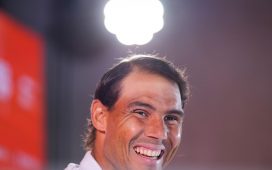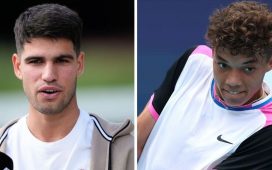Success among older athletes is all the rage with Phil Mickelson winning the P.G.A. Championship last month at 50, Tom Brady winning a Super Bowl in February at 43 and Sue Bird winning a W.N.B.A. title last year at 39.
There is clearly a role-modeling effect underway. Venus, who will turn 41 on June 17, is fading but still on tour, playing with tape and day-to-day pain of her own yet still hitting winners past women half her age.
Roger Federer, who will turn 40 in August, remains in contention at this French Open after looking quick off the mark again on Thursday as he defeated his longtime rival Marin Cilic in four sets on the same patch of red clay where Williams beat Collins in cooler, heavier conditions.
Seven Americans played third-round singles matches on Thursday, including four men: John Isner, Steve Johnson, Reilly Opelka and Marcos Giron. Williams was the only American to prevail, and I asked the 27-year-old Collins afterward if seeing Williams and other icons succeed late into their 30s and beyond made her view her own future differently.
“I think that should give a lot of different athletes confidence, younger athletes especially, not to put as much pressure on themselves,” Collins said. “You’re seeing some of the greatest athletes in the world have some of their best success once they’re a little bit older. I think that goes to the maturity, the experience that they have at that point. It just shows how much of sports is a mental game, more so than just a physical game. It should give players confidence to see somebody like Serena or Tom Brady or Phil Mickelson.”
Of course, Williams, Federer, Brady and Mickelson were all young phenoms before they became enduring superstars. What made them exceptional initially has helped keep them exceptional, but they have also had to adapt: training differently, eating more carefully and, in the cases of Williams and Federer, competing more efficiently.
“Serena has had to make adjustments, just like Roger, to remain a factor at the majors,” Rubin said. “Look at Roger, being more aggressive and moving in, taking on that challenge, so I think that kind of adaptability is a requirement.”







